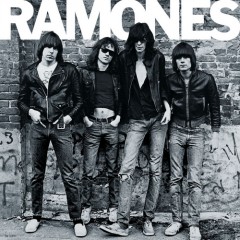The pop-rock era has only produced two flawless full-length records: Pet Sounds by the Beach Boys and Ramones, the debut album by the Ramones.
I am not talking about “great,” or “influential,” or “classic,” or “favorite” – I am talking about flawless.
 Now, a pile of records are near-flawless – Abbey Road, Funhouse by the Stooges, Pink Flag by Wire, and Back in Black by AC/DC all come very, very close – and there are literally hundreds of perfect singles, and of course there’s a plethora of fantastic, classic, treasured albums; but I do believe that the pop-rock era (which I am defining as the fifty years since the Beatles’ debuted) has only produced two flawless albums.
Now, a pile of records are near-flawless – Abbey Road, Funhouse by the Stooges, Pink Flag by Wire, and Back in Black by AC/DC all come very, very close – and there are literally hundreds of perfect singles, and of course there’s a plethora of fantastic, classic, treasured albums; but I do believe that the pop-rock era (which I am defining as the fifty years since the Beatles’ debuted) has only produced two flawless albums.
Flawless: not one single unnecessary bar or beat on any song, nor any song less than the great sum of the albums’ parts; not one single bar or beat unworthy of joyful abandon and detailed examination, yet not one second or one minute distracts from (or is incompatible with) the whole; every moment compelling to the ear without being overwhelming, and inspiring to the heart without insisting; every chord and arrangement choice perfectly chosen, a perfect object heard perfectly by the listener who expected nothing more yet is so drawn in by the experience that they expect nothing less; every moment is riveting without being distracting in its’ brilliance, on both macro and micro levels; every song evokes recognition, yet is “startling” enough to keep casual and experienced listener engaged; every musical choice fascinating, intent-filled, and ideal; not one half-second of the whole experience too long or too short, either on the micro or macro level.
…and you are left with Pet Sounds and Ramones.
(Because even the most extraordinary and exemplary albums – let’s say The White Album, for example, or Velvet Underground and Nico, or White Light White Heat – have, in essence, their flaws built into them, as part of the whole experience; some of our greatest albums are, indeed, flawed; but I speak here of the only two flawless albums I am aware of, the eleventh album by the Beach Boys and the first album by the Ramones.)
Despite a lot of contemporary (and reflective) hype to the contrary, the Anglo-American flowering of punk rock circa ’75 – ’77 was anything but a clean break; rather, it was a natural evolution (albeit a very welcome one). 99% of the British and American bands of that era were elaborating on, re-interpreting, or bringing to its’ natural minimal conclusion the work and styles of extant (or extinct) bands like the Stooges, Mott the Hoople, the Small Faces, the Who, the Dolls, the 13th Floor Elevators, Roxy Music, the MC5, the Sonics, the Velvets, the Crystals, and literally hundreds and hundreds of others. New music of the initial punk era whose direct stylistic antecedents cannot be traced back to pre-existing (and to a degree, “approved”) reference point are so few and far between as to be statistically irrelevant: there’s the Residents, Suicide, and the Electric Eels, all of whom (somewhat significantly) pre-date the “punk” era (and there’s a few who fall on the post-punk cusp, like Young Marble Giants, DNA, and PiL); BUT BASICALLY, despite the hype, EVERYONE WAS RE-SHUFFLING THE EXISTING GENE POOL.
Except for the Ramones.
The Ramones are so completely and utterly identified with the punk movement that it is extremely easy to overlook their stunning artistic, sonic, and conceptual originality. In fact, although they were socially part of the punk movement, the Ramones were doing something so extreme musically, so utterly distinct, that it is literally an art-crime to lump them in with Television, the Pistols, Blondie, and all the other (truly) wonderful bands of their era. In true fact, the Ramones assumption of utter minimalism in the service of rhythm, melody, and energy can only accurately be compared to Kraftwerk, a group that appears dissimilar but was, in fact, radically similar; both bands composed the most utterly simple pop songs and unsophisticated chord changes, descended from bubblegum and the Beach Boys (and completely discarding the ubiquitous tradition of Beatles-pop), presenting them completely and utterly devoid of instrumental solos, and featuring bass (or bass-representing instruments) that never, ever deviated from the tonic note. I am not entirely sure there had been a “solo-less” rock band prior to the Ramones (or a band whose bassist so religiously adhered to the tonic note); however, I am quite sure there had not been a rock band that performed exclusively songs that featured only bar chords, no single or multiple-string solos, and a bass that only and exclusively followed the tonic note of the guitar chord. This formula is, without any doubt, as radical as the work of LaMonte Young (the drone pioneer whose work birthed the Velvet Underground), John Cage’s experiments with silence, or Satie’s explorations into maximum melodic minimalism.
In other words, Ramones is not just pure art; it’s RADICAL art, but not apparently so, since it’s married to the most simple, repetitive, and attractive melodies.
No rock band in the entire rock era (I am now expanding parameters, I am talking ’51 to present, not just ’64 to present) created such a radical scene change as Ramones and Kraftwerk; no one “mainstream” artist, not the Beatles, not the Velvets, not Elvis, introduced such new and virgin and influential territory. Kraftwerk and the Ramones literally created entirely new rules and an entirely new vocabulary, and they did so in a completely user-friendly fashion. In fact, you have to go back to 1926 and Louis Armstrong and the Hot 5’s recording of “Heebie Jeebies” to find anything remotely comparable to the TOTAL but user-friendly scene change the Ramones and Kraftwerk engendered; and that both bands introduced such a similar scene-change at roughly the same time makes it, I think, essential to discuss both bands together.
Which not enough people do, which is just fucking stupid. They are profoundly similar bands, introducing profoundly similar scene changes to the landscape of pop-rock.
The Ramones’ West German cousins, Kraftwerk, were doing preciscely the same thing, only instead of using the bar chord exclusively, they invented the use of the synthesizer as a rhythmic, chordal device to replace tonic bass and bar chord. In fact, Kraftwerk’s 1974 breakthrough, “Autobahn,” is so similar melodically and chordally to “Blitzkrieg Bop” as to be virtually a variation on the same theme.
Which is all to say…
Ramones is a work of art. It is perfect, a word that (after 40 years of listening to, studying, making my living in, and being generally obsessed by pop-rock )I do not use lightly. It is gorgeous, economical in its’ choices, luxurious in its power, seductive in its melody, lacking not one single unneeded moment, but never, not for one instant, seeming rushed or thrifty. It is beautiful and powerful, wave upon wave of joy that raises the bar not just on the listeners’ expectations, but sets the bar for an entire generation.
The metronomic, absolute precise drumming of Tommy Ramone – powerful and broad but so deeply economic in its’ choices that it virtually adheres, though almost certainly not intentionally, to the “motortik” aesthetic of the Krautrock movement then extant in West Germany — is an absolute essential part of the realization of that album, not to mention Tommy’s role as co-producer; I cannot, ever, honor enough his achievements.
Other Ramones albums were brilliant – I am especially fond of Leave Home and End of the Century – but they never made another “perfect” album (much as the Beach Boys never made a second “perfect” album). The alignment that created Ramones – the desire and willingness to create something absolutely, startlingly new, yet couple it to un-shocking melody and the pure seduction of 4/4 time unobstructed by drum rolls or syncopation – could never exist as pure in intent and magical in execution ever again; having done it once, not only would they and the world know it had been done before, but they would never have the ability (or lack thereof) to do precisely the same thing again (as the Buddha says, you cannot put your hand in the same river twice). Every moment, every second, every bar, every element of the mix, every quirkless moment of production, is flawless, and it is ours forever, the gift of Tommy, Joey, Johnny, and Dee Dee to the world.
Now, all four of the gentlemen on the cover of that album are gone from this incarnation. This is an almost incomprehensible tragedy. We have lost our last living link to one of the only perfect albums ever made, one of the most important bands that ever existed. There is no “up” side to this, no heartwarming, uplifting refrain; there is, however, the perfection of Ramones. It is unfair to say that it birthed a movement, or influenced others; it is just perfection, in of itself, its own beautiful moment in time that remains perfect, to every listener hearing it for the 480,000th time, and every new listener. Perfection. Perfection. Perfection.



